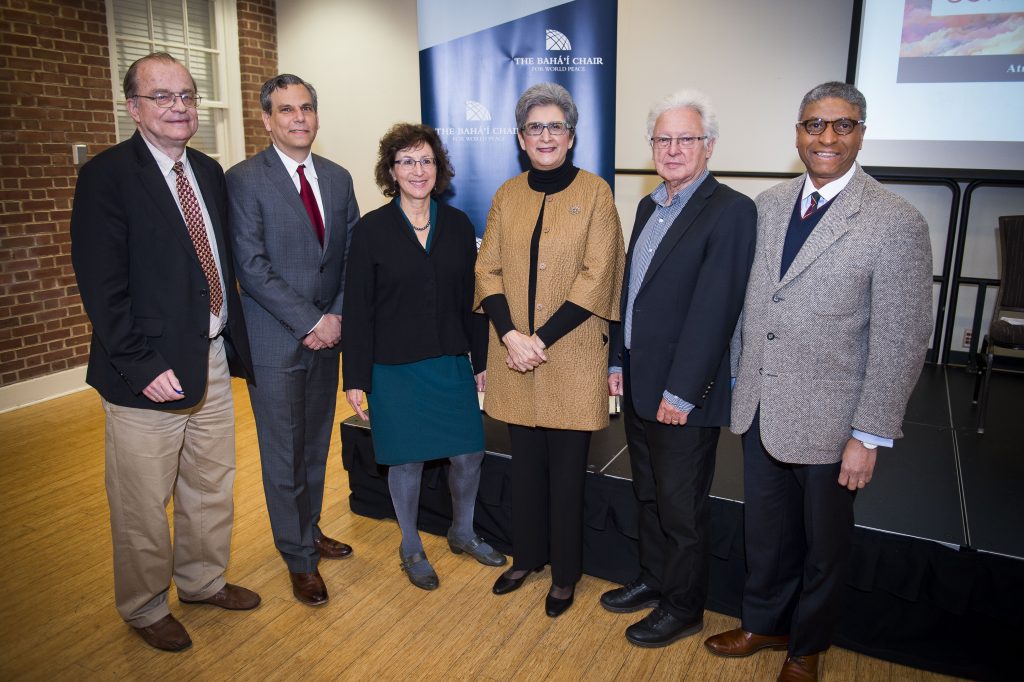This is an insight written by Alawi Masud on The Ethical Foundations of Human Rights Conference, hosted by the Bahá’í Chair for World Peace on March 28, 2018.
Codification
Human Rights have been in an increasingly contested position as of late. On the one hand the salience of human rights has increased due to a multitude of initiatives such as the UN’s Responsibility to Protect protocols. Rights have also been increasingly codified into the laws of various sovereign states and supranational & nongovernmental organizations. On the other hand, the legitimacy of human rights has decreased as the number of violations committed by individuals and state actors have increased.
With human rights being in such a contested state, the concept itself has been placed under scrutiny. However the questions are usually along the lines of “why” and “how”. What is missing from the conversation is “what”. The Ethical Foundations of Human Rights Conference, hosted by the The Bahá’í Chair for World Peace on the 28th of March, sought to answer this vital question.
Common Humanity
The Keynote Speaker, Dr. Raimond Gaita spoke on the topic of, “Human Rights and the Frail Idea of A Common Humanity”. The talk was based upon the very idea of human beings as a common group and how that is reconciled with not just the idea of us as individuals but the idea of us as a nationality, an ethnicity, or any other type of characterization. His framing of this topic through logic strongly grounds this abstract notion, and his use of logic took hold of my attention.
Next came Dr. Samuel J. Kerstein, who spoke on the topic of “Treating Others Merely as Means”. He introduces his lecture with the Universal Declaration of Human Rights, and in this he focused on one interesting word: Dignity. The way that dignity is framed in the UDHR sets forth the concept that Human Rights derive from the inherent dignity of a person. This launches into Dr. Kerstein’s main point, which is that humans have an inalienable value to them. By treating others as means, such as only regarding a waiter as an instrument to serve you food, we deny this inalienable value. He then smartly uses real world examples about the positive and negative consequences of this notion.
Movements
Dr. Kerstein was followed by Dr. Alison Brysk with a lecture entitled “Speaking Rights: The Ethos of Human Rights and the Crisis of Cosmopolitanism”. Her analysis on human rights had a more case study approach. Signifying what human rights meant to various movements across the world. The findings that she presented showed not only the universality of human rights, but how this one concept can be shown in an expansive number of ways.
Dr. Karol Soltan followed with his lecture, “Looking for a deeper meaning of the Universal Declaration of Human Rights” . Dr. Soltan takes a historical approach on human rights and asks what truly held together the different generations of human rights. Focusing specifically on The Universal Declaration of Human Rights Dr. Soltan takes a critical lens to what the concept of human rights means in our current society and how it shapes who we are as a society. He emphasizes a consciousness of our time in history, a consciousness lost in the current discourse.
Painting a Conclusion
The conference ended with a roundtable where Dr. Michael Penn moderated a lively discussion amongst the four speakers and the audience. Dr. Penn-instead of having a preset list of questions, instead played off the questions raised by the audience and the speakers to push the debate happening on stage and to seek out more detailed understanding of the crucial topics being discussed.

From L-R: Dr. Karol Soltan, Dr. Samuel J. Kerstein, Dr. Alison Brysk, Dr. Hoda Mahmoudi, Dr. Raimond Gaita, and Dr. Michael Penn
Overall, The Ethical Foundations of Human Rights Conference has the potential of creating a new framework to view human rights. In the light of the 70th anniversary of the Universal Declaration of Human Rights, the conference was a worthy reevaluation of Human Rights.
You can watch the lectures and roundtable here:
About the Author:
 Alawi Masud is an undergraduate at the University of Maryland, College Park, studying Government & Politics with a focus in International Relations. He is currently working as a student intern for our very own Bahá’í Chair for World Peace. Through cooperation, mutual aid, and academic understanding, he inspires to make the world united towards a better future.
Alawi Masud is an undergraduate at the University of Maryland, College Park, studying Government & Politics with a focus in International Relations. He is currently working as a student intern for our very own Bahá’í Chair for World Peace. Through cooperation, mutual aid, and academic understanding, he inspires to make the world united towards a better future.
Photo Credits:
Lisa Helfert: Picture of Speakers
Lori Evelyn Allan: Header Image
